2023年中考英语一轮复习 九年级Unit 3~Unit 4课件(共56张PPT)
文档属性
| 名称 | 2023年中考英语一轮复习 九年级Unit 3~Unit 4课件(共56张PPT) |  | |
| 格式 | pptx | ||
| 文件大小 | 578.5KB | ||
| 资源类型 | 教案 | ||
| 版本资源 | 人教新目标(Go for it)版 | ||
| 科目 | 英语 | ||
| 更新时间 | 2023-06-07 12:56:54 | ||
图片预览

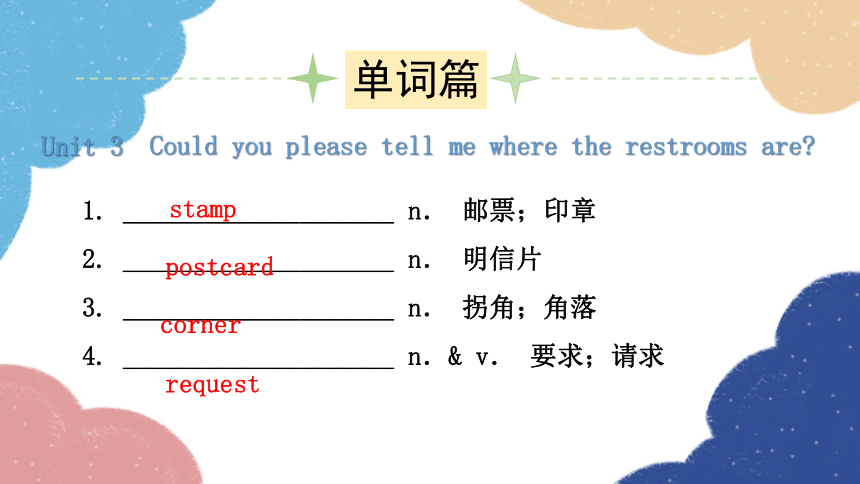

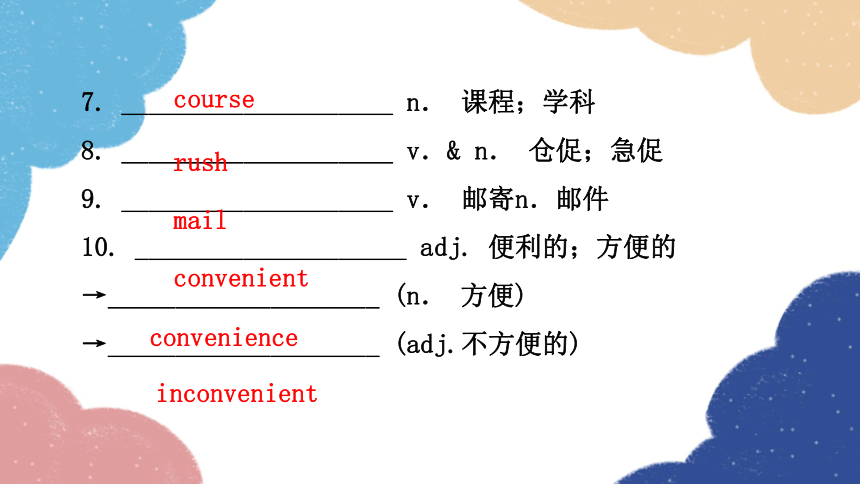
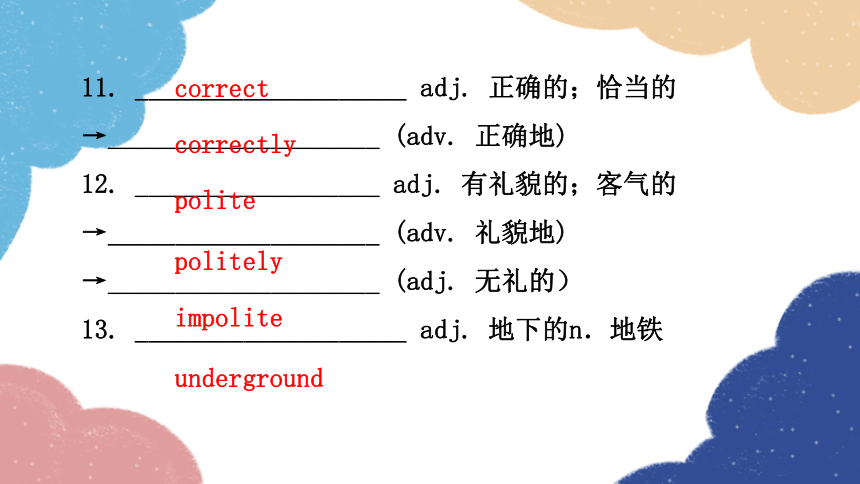
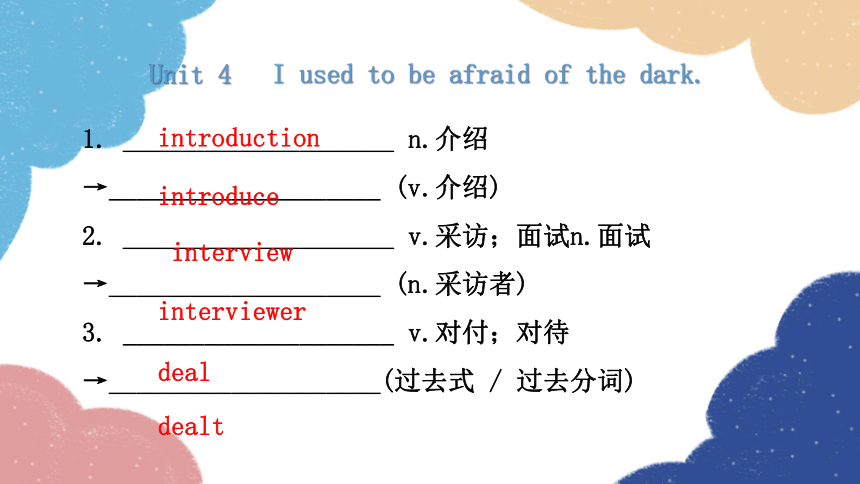
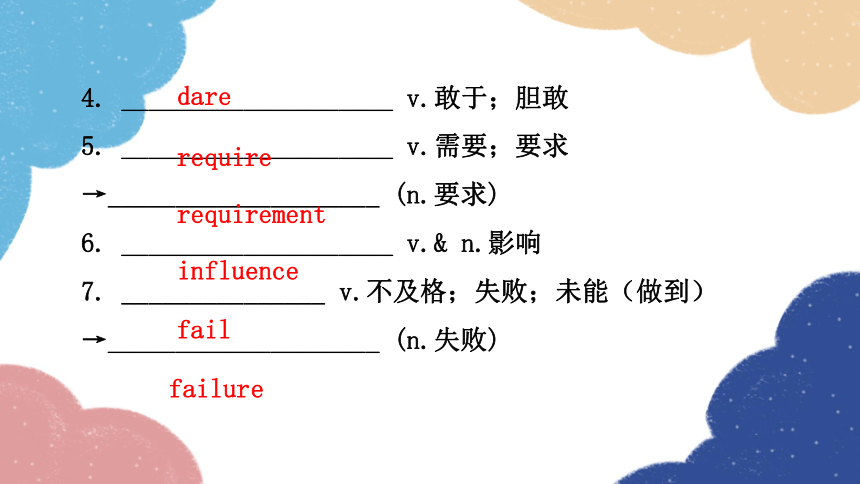
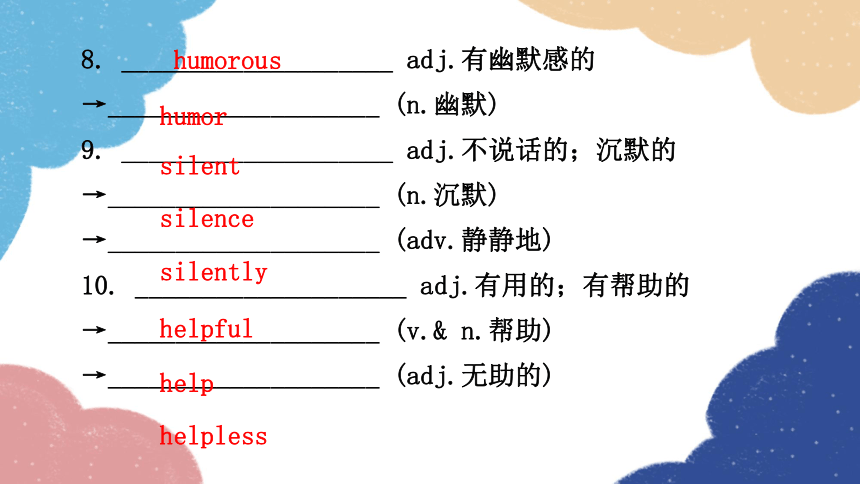


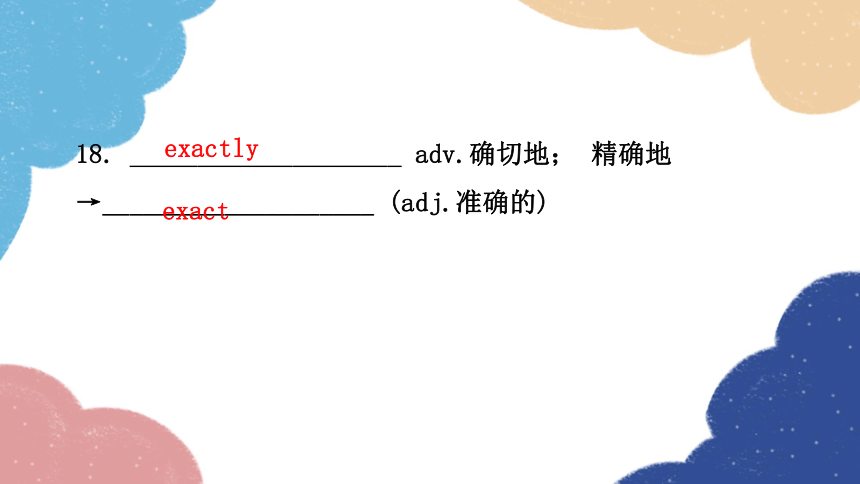
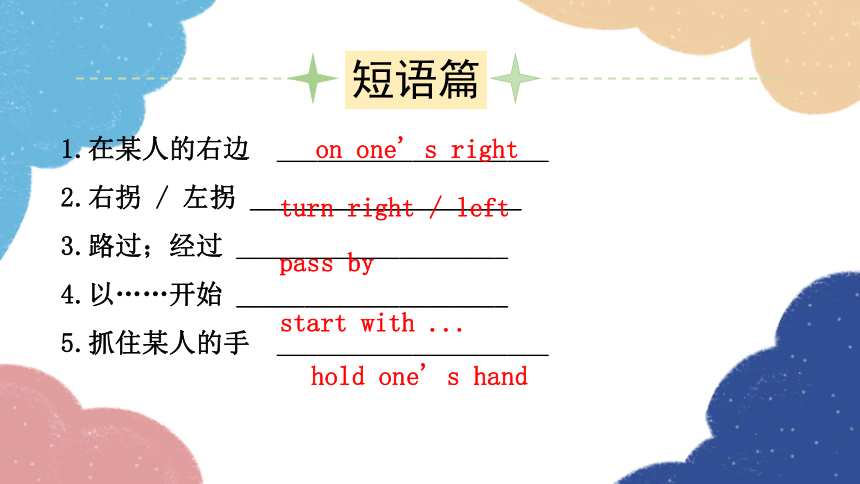
文档简介
(共56张PPT)
教材梳理(RJ)
九年级 Unit 3~Unit 4
Unit 3 Could you please tell me where the restrooms are
单词篇
1. ____________________ n. 邮票;印章
2. ____________________ n. 明信片
3. ____________________ n. 拐角;角落
4. ____________________ n.& v. 要求;请求
stamp
postcard
corner
request
5. ____________________ n. 方向;方位
→____________________ (adj. 直接的)
→____________________ (adv. 直接地)
→____________________ (n. 导演)
6. __________________ n. 住址;地址;通讯处
direction
direct
directly
director
address
7. ____________________ n. 课程;学科
8. ____________________ v.& n. 仓促;急促
9. ____________________ v. 邮寄n.邮件
10. ____________________ adj. 便利的;方便的
→____________________ (n. 方便)
→____________________ (adj.不方便的)
course
rush
mail
convenient
convenience
inconvenient
11. ____________________ adj. 正确的;恰当的
→____________________ (adv. 正确地)
12. __________________ adj. 有礼貌的;客气的
→____________________ (adv. 礼貌地)
→____________________ (adj. 无礼的)
13. ____________________ adj. 地下的n.地铁
correct
correctly
polite
politely
impolite
underground
Unit 4 I used to be afraid of the dark.
1. ____________________ n.介绍
→____________________ (v.介绍)
2. ____________________ v.采访;面试n.面试
→____________________ (n.采访者)
3. ____________________ v.对付;对待
→____________________(过去式 / 过去分词)
introduction
introduce
interview
interviewer
deal
dealt
4. ____________________ v.敢于;胆敢
5. ____________________ v.需要;要求
→____________________ (n.要求)
6. ____________________ v.& n.影响
7. _______________ v.不及格;失败;未能(做到)
→____________________ (n.失败)
dare
require
requirement
influence
fail
failure
8. ____________________ adj.有幽默感的
→____________________ (n.幽默)
9. ____________________ adj.不说话的;沉默的
→____________________ (n.沉默)
→____________________ (adv.静静地)
10. ____________________ adj.有用的;有帮助的
→____________________ (v.& n.帮助)
→____________________ (adj.无助的)
humorous
humor
silent
silence
silently
helpful
help
helpless
11. ____________________ adj.亚洲的n.亚洲人
→____________________ (n.亚洲)
12. ____________________ adj.欧洲的n.欧洲人
→____________________ (n.欧洲)
13. ____________________ adj.非洲的n.非洲人
→____________________ (n.非洲)v
Asian
Asia
European
Europe
African
Africa
14. ____________________ adj.英国(人)的
→____________________ (n.大不列颠)
15. ____________________ adj.缺席;不在
→____________________ (n.缺席)
16. ____________________ adj.自豪的;骄傲的
17. ____________________ adj.普遍的n.将军
→____________________ (adv.普遍地)
British
Britain
absent
absence
proud
general
generally
18. ____________________ adv.确切地; 精确地
→____________________ (adj.准确的)
exactly
exact
短语篇
1.在某人的右边 ____________________
2.右拐 / 左拐 ____________________
3.路过;经过 ____________________
4.以……开始 ____________________
5.抓住某人的手 ____________________
on one' s right
turn right / left
pass by
start with ...
hold one' s hand
6.在某人去……的路上 ____________________
7.对做某事感到兴奋 ____________________
8.花费时间做某事 ________________________
9.期望(做)某事 ____________________________
10.过去常常做某事 _______________________
on one' s way to ...
be excited to do sth.
spend time (in) doing sth.
look forward to (doing) sth.
used to do sth.
11.公开地;在别人面前 ____________________
12.时常;有时 ____________________
13.亲身;亲自 ____________________
14.应对;处理 ____________________
15.照顾;照料 ____________________
16.为……骄傲 ____________________
in public
from time to time
in person
deal with
take care of
be proud of
17.为……感到自豪 ____________________
18.害怕 ____________________
19.敢于做某事 ____________________
20.许多 ____________________
21.对某事紧张 ____________________
take pride in
be afraid of
dare to do sth.
tons of
be nervous about sth.
课文篇
句式复习
1.起初我好害怕,但大声喊还很管用。
______________________________________________
2.知道如何礼貌地寻求帮助是重要的。
______________________________________________
I was scared at first, but shouting did help.
It is important to know how to ask for help politely.
3.葆拉过去真的很安静。
___________________________________________4.很难相信他过去在学校有许多困难。
___________________________________________
___________________________________________
Paula used to be really quiet.
It is hard to believe that he used to have difficulties in school.
语篇再现
Passage 1【九年级Unit 3】
Good speakers change the way they speak 1.__________ different situations. The expressions they use might depend on 2.__________ they are speaking to or how well they know each other. It is all right to ask your classmates direct questions because
in
whom
you know them well. 3.__________, if you say to your teacher, “When is the school trip ”, this might sound 4.__________. But if you say, “Excuse me, Mr.West. Do you know when the school trip is ”,this will sound 5.__________ more polite.
However
impolite
much
Passage 2【九年级Unit 4】
I asked Candy 1.__________ life was different after she became famous. She explained 2.____ there are many good things, 3._______ being able to travel and meet new people all the time. “I didn' t use to be popular in school, but now I get tons 4.______ attention everywhere I go.” However, too
how
that
like
of
5.__________ attention can also be a bad thing. “I always have to 6.__________ about how I appear to others, and I have to be very 7.__________ about what I say or do. And I don' t have much 8.__________ time anymore. 9.__________ out with friends is almost impossible for me now 10.__________ there are always guards around me.”
much
worry
careful
private
Hanging
because
考点篇
1.她建议坐火车去那儿。
______________________________________________
2.他建议我们在这里建一座桥。
______________________________________________
考点1
suggest的用法【九年级Unit 3】
专练
汉译英
She suggests going there by train.
He suggested that we (should) build a bridge here.
点拨
suggest作动词,意为“建议;提议”,其名词形式为suggestion。用法如下:1.suggest (doing) sth.意为“建议 / 提议(做)某事”。2.suggest可接that引导的宾语从句,此时宾语从句要用虚拟语气,即“should+动词原形”,其中should可省略。
考点2
used to结构的用法【九年级Unit 4】
1.我过去常常和爷爷下国际象棋。
I ____________________ with Grandpa.
2.他们曾经不吃肉。They ____________________ meat.
3.她过去常常戴眼镜吗 ____________________ glasses
专练
根据汉语意思完成句子,词数不限
used to play chess
didn' t use to eat
Did she use to wear
点拨
used to后接动词原形,意为“过去常常做某事”,表示过去与现在的对比,暗含现在已经不存在的动作或状态。句型为:1.肯定句:主语+used to+v.+其他.2.否定句:主语+didn' t use to+v.+其他.3.一般疑问句:Did+主语+use to+v.+其他
拓展
be / get used to (doing) sth. 习惯于(做)某事
use ... to do ... 用……做……
be used to do sth.被用来做某事
be used for (doing) sth.被用来做某事
考点3
proud和pride的区别【九年级Unit 4】
1. My parents take _________ in what I' m doing.
2. He was _________ of himself for not giving up.
专练
根据句意,用proud或pride填空
pride
proud
点拨
proud作形容词,意为“自豪的;骄傲的”。pride作名词,意为 “自豪;骄傲”。be proud of=take pride in,意为“为……骄傲;感到自豪”。
考点4
too much, too many和much too的区别
【九年级Unit 4】
1.你犯的错误太多了。You made ___________________.
2.我看电视花的时间太多。
I spend ____________________ watching television.
3.另一个太贵了。
The other one was ____________________.
专练
根据汉语意思完成句子,词数不限
too many mistakes
too much time
much too expensive
点拨
too much和too many均意为“太多”,但too much后接不可数名词,too many后接复数名词。much too意为“太;非常”,相当于too,但语气更强,后接形容词或副词。
演练篇
一、语法选择
It was a very foggy (雾茫茫的) morning in London. The fog was so thick that it was ____1____to see more than one foot(英尺). Buses, cars and taxis were stopped along the roadside, unable to move because the drivers couldn' t _____2_____. People were trying to walk to ____3____destinations (目的地), but most were losing their way in the fog.
impossible
see
their
Mr.Smith had a very important meeting at the House of Commons, ____4_____ he was not familiar(熟悉的) with the area and ____5____ could take him there in such heavy fog. So he was a little worried. He was trying to find his way in the fog. Soon, however, he realized that he was
but
nobody
lost. Suddenly he bumped (撞) into _____6____ stranger. Mr.Smith said sorry to the stranger and then asked him whether he _____7____ help him find his way. The stranger said it was a piece of cake and offered ____8____ Mr.Smith to the meeting place. Mr.Smith thanked him and they
a
could
to take
started to walk. The fog ____9____ thicker and thicker every minute but the stranger had no difficulty in finding the way. They went along one street, turned down another, crossed a square and at last, after about half an hour, they arrived at the meeting place.
was getting
Mr.Smith couldn' t understand how the stranger found his way. “It is wonderful,” he said. “But ____10____ do you find the way in the thick fog ”“It is no trouble at all to me,” said the stranger. “I am blind.”
how
( )1.A. impossibly B. impossibility C. impossible
( )2.A. see B. seeing C. to see
( )3.A. them B. their C. they
( )4.A. or B. and C. but
( )5.A. somebody B. everybody C. nobody
( )6.A. a B. an C. the
C
A
B
C
C
A
( )7.A. need B. must C. could
( )8.A. taking B. to take C. take
( )9.A. gets B. was getting C. got
( )10.A. how B. why C. what
C
B
B
A
二、阅读理解(A篇)
Alice I used to be short and fat, but now I have changed so much. I' m tall and thin now. However, there' s something that is hard to be changed. I' m still shy as before. People say that I need to be more outgoing, but it is hard for me. I have few friends at school. Is there anyone who can help me
Steve I am the same as you. I mean that is also a problem for me. I am introverted (内向的) like you. It' s hard for me to get on well with others.
Kelly I used to be shy when I was younger, and it was hard for me to talk with others. Then I found I had to change myself. Just talk to the people around you and be more active, but don' t talk about anything that you don' t want anyone to know.
Rose You just need to speak out your mind. Believe yourself and say what you want to say. Anyway, don' t be afraid of shyness—you are valued for what you are!
Sarah It can help you a lot to try to join clubs or a sports team at school. To get over shyness, you can also try new things and practice conversation.
( )11. What' s Steve' s problem
A.He is a shy boy.
B.He doesn' t believe others.
C.It' s hard to change himself.
D.His friends don' t like him.
A
( )12. How many people give advice on Alice' s problem
A.Two. B.Three.
C.Four. D.Five.
B
( )13. 2022新考法:图片理解题 What did Alice use to look like
A
( )14. Which of the following is Rose' s advice
①Speak out your mind.
②Join a sports team. ③Believe yourself.
④Be more active. ⑤Say what you want to say.
⑥Don' t be afraid of shyness.
A.②④⑤⑥ B.①②④⑤
C.①③⑤⑥ D.②③⑤⑥
C
( )15. Where may we see this passage
A.In a science book. B.On the menu.
C.At a train station. D.On the Internet.
D
三、回答问题
“How are you ” is a nice question. It' s a friendly way that people in the USA greet each other. But “How are you ” is also a very unusual question. It' s a question that often doesn' t need an answer. The person who asks “How are you ” hopes to hear the answer “Fine” which isn' t really an answer. It is simply another way of saying “Hello” or “Hi”.
Sometimes, people also don' t say exactly what they mean. For example, when someone asks “Do you agree ”, the other person might think, “No, I don' t agree. I think you are wrong.” But it isn' t very polite to disagree so strongly, so the other person might say “I' m not sure.” It' s a nicer way to say that you don' t agree with someone.
People also don' t say exactly what they are thinking when they finish talking with other people. For example, many talks over the phone finish when one person says “I' ve to go now.” Often, the person who wants to hang up gives an excuse: “Someone is at the door.” or “Something is burning on the stove(炉子).” The excuse might be real.
Perhaps the person who wants to hang up simply doesn' t want to talk any more, but it isn' t polite to say that. The excuse is more polite, and it doesn' t hurt the other person.
Whether they are greeting each other, talking about an idea, or finishing a talk, people don' t say exactly what they are thinking. It' s an important way that people try to be nice to each other. It' s part of the game of language.
16.When a person in America asks “How are you ”, what does he hope to hear
______________________________________________________________________________________
17.Why a person doesn' t say “No, I don' t agree. I think you are wrong.” when he disagrees with someone
___________________________________________
The person / He hopes to hear the answer “Fine”. / The answer “Fine”.
Because it isn' t very polite to disagree so strongly.
18.Who often gives an excuse when finishing a talk over the phone
______________________________________________________________________________________
19.What does the writer think of the excuse
______________________________________________________________________________________
The person who wants to hang up often gives an excuse. / The person who wants to hang up.
The writer thinks the excuse is more polite, and it doesn' t hurt the other person.
20.How many examples does the writer list to explain that people don' t say exactly what they are thinking
___________________________________________
The writer lists three / 3 examples. / Three / 3.
THANKS!
教材梳理(RJ)
九年级 Unit 3~Unit 4
Unit 3 Could you please tell me where the restrooms are
单词篇
1. ____________________ n. 邮票;印章
2. ____________________ n. 明信片
3. ____________________ n. 拐角;角落
4. ____________________ n.& v. 要求;请求
stamp
postcard
corner
request
5. ____________________ n. 方向;方位
→____________________ (adj. 直接的)
→____________________ (adv. 直接地)
→____________________ (n. 导演)
6. __________________ n. 住址;地址;通讯处
direction
direct
directly
director
address
7. ____________________ n. 课程;学科
8. ____________________ v.& n. 仓促;急促
9. ____________________ v. 邮寄n.邮件
10. ____________________ adj. 便利的;方便的
→____________________ (n. 方便)
→____________________ (adj.不方便的)
course
rush
convenient
convenience
inconvenient
11. ____________________ adj. 正确的;恰当的
→____________________ (adv. 正确地)
12. __________________ adj. 有礼貌的;客气的
→____________________ (adv. 礼貌地)
→____________________ (adj. 无礼的)
13. ____________________ adj. 地下的n.地铁
correct
correctly
polite
politely
impolite
underground
Unit 4 I used to be afraid of the dark.
1. ____________________ n.介绍
→____________________ (v.介绍)
2. ____________________ v.采访;面试n.面试
→____________________ (n.采访者)
3. ____________________ v.对付;对待
→____________________(过去式 / 过去分词)
introduction
introduce
interview
interviewer
deal
dealt
4. ____________________ v.敢于;胆敢
5. ____________________ v.需要;要求
→____________________ (n.要求)
6. ____________________ v.& n.影响
7. _______________ v.不及格;失败;未能(做到)
→____________________ (n.失败)
dare
require
requirement
influence
fail
failure
8. ____________________ adj.有幽默感的
→____________________ (n.幽默)
9. ____________________ adj.不说话的;沉默的
→____________________ (n.沉默)
→____________________ (adv.静静地)
10. ____________________ adj.有用的;有帮助的
→____________________ (v.& n.帮助)
→____________________ (adj.无助的)
humorous
humor
silent
silence
silently
helpful
help
helpless
11. ____________________ adj.亚洲的n.亚洲人
→____________________ (n.亚洲)
12. ____________________ adj.欧洲的n.欧洲人
→____________________ (n.欧洲)
13. ____________________ adj.非洲的n.非洲人
→____________________ (n.非洲)v
Asian
Asia
European
Europe
African
Africa
14. ____________________ adj.英国(人)的
→____________________ (n.大不列颠)
15. ____________________ adj.缺席;不在
→____________________ (n.缺席)
16. ____________________ adj.自豪的;骄傲的
17. ____________________ adj.普遍的n.将军
→____________________ (adv.普遍地)
British
Britain
absent
absence
proud
general
generally
18. ____________________ adv.确切地; 精确地
→____________________ (adj.准确的)
exactly
exact
短语篇
1.在某人的右边 ____________________
2.右拐 / 左拐 ____________________
3.路过;经过 ____________________
4.以……开始 ____________________
5.抓住某人的手 ____________________
on one' s right
turn right / left
pass by
start with ...
hold one' s hand
6.在某人去……的路上 ____________________
7.对做某事感到兴奋 ____________________
8.花费时间做某事 ________________________
9.期望(做)某事 ____________________________
10.过去常常做某事 _______________________
on one' s way to ...
be excited to do sth.
spend time (in) doing sth.
look forward to (doing) sth.
used to do sth.
11.公开地;在别人面前 ____________________
12.时常;有时 ____________________
13.亲身;亲自 ____________________
14.应对;处理 ____________________
15.照顾;照料 ____________________
16.为……骄傲 ____________________
in public
from time to time
in person
deal with
take care of
be proud of
17.为……感到自豪 ____________________
18.害怕 ____________________
19.敢于做某事 ____________________
20.许多 ____________________
21.对某事紧张 ____________________
take pride in
be afraid of
dare to do sth.
tons of
be nervous about sth.
课文篇
句式复习
1.起初我好害怕,但大声喊还很管用。
______________________________________________
2.知道如何礼貌地寻求帮助是重要的。
______________________________________________
I was scared at first, but shouting did help.
It is important to know how to ask for help politely.
3.葆拉过去真的很安静。
___________________________________________4.很难相信他过去在学校有许多困难。
___________________________________________
___________________________________________
Paula used to be really quiet.
It is hard to believe that he used to have difficulties in school.
语篇再现
Passage 1【九年级Unit 3】
Good speakers change the way they speak 1.__________ different situations. The expressions they use might depend on 2.__________ they are speaking to or how well they know each other. It is all right to ask your classmates direct questions because
in
whom
you know them well. 3.__________, if you say to your teacher, “When is the school trip ”, this might sound 4.__________. But if you say, “Excuse me, Mr.West. Do you know when the school trip is ”,this will sound 5.__________ more polite.
However
impolite
much
Passage 2【九年级Unit 4】
I asked Candy 1.__________ life was different after she became famous. She explained 2.____ there are many good things, 3._______ being able to travel and meet new people all the time. “I didn' t use to be popular in school, but now I get tons 4.______ attention everywhere I go.” However, too
how
that
like
of
5.__________ attention can also be a bad thing. “I always have to 6.__________ about how I appear to others, and I have to be very 7.__________ about what I say or do. And I don' t have much 8.__________ time anymore. 9.__________ out with friends is almost impossible for me now 10.__________ there are always guards around me.”
much
worry
careful
private
Hanging
because
考点篇
1.她建议坐火车去那儿。
______________________________________________
2.他建议我们在这里建一座桥。
______________________________________________
考点1
suggest的用法【九年级Unit 3】
专练
汉译英
She suggests going there by train.
He suggested that we (should) build a bridge here.
点拨
suggest作动词,意为“建议;提议”,其名词形式为suggestion。用法如下:1.suggest (doing) sth.意为“建议 / 提议(做)某事”。2.suggest可接that引导的宾语从句,此时宾语从句要用虚拟语气,即“should+动词原形”,其中should可省略。
考点2
used to结构的用法【九年级Unit 4】
1.我过去常常和爷爷下国际象棋。
I ____________________ with Grandpa.
2.他们曾经不吃肉。They ____________________ meat.
3.她过去常常戴眼镜吗 ____________________ glasses
专练
根据汉语意思完成句子,词数不限
used to play chess
didn' t use to eat
Did she use to wear
点拨
used to后接动词原形,意为“过去常常做某事”,表示过去与现在的对比,暗含现在已经不存在的动作或状态。句型为:1.肯定句:主语+used to+v.+其他.2.否定句:主语+didn' t use to+v.+其他.3.一般疑问句:Did+主语+use to+v.+其他
拓展
be / get used to (doing) sth. 习惯于(做)某事
use ... to do ... 用……做……
be used to do sth.被用来做某事
be used for (doing) sth.被用来做某事
考点3
proud和pride的区别【九年级Unit 4】
1. My parents take _________ in what I' m doing.
2. He was _________ of himself for not giving up.
专练
根据句意,用proud或pride填空
pride
proud
点拨
proud作形容词,意为“自豪的;骄傲的”。pride作名词,意为 “自豪;骄傲”。be proud of=take pride in,意为“为……骄傲;感到自豪”。
考点4
too much, too many和much too的区别
【九年级Unit 4】
1.你犯的错误太多了。You made ___________________.
2.我看电视花的时间太多。
I spend ____________________ watching television.
3.另一个太贵了。
The other one was ____________________.
专练
根据汉语意思完成句子,词数不限
too many mistakes
too much time
much too expensive
点拨
too much和too many均意为“太多”,但too much后接不可数名词,too many后接复数名词。much too意为“太;非常”,相当于too,但语气更强,后接形容词或副词。
演练篇
一、语法选择
It was a very foggy (雾茫茫的) morning in London. The fog was so thick that it was ____1____to see more than one foot(英尺). Buses, cars and taxis were stopped along the roadside, unable to move because the drivers couldn' t _____2_____. People were trying to walk to ____3____destinations (目的地), but most were losing their way in the fog.
impossible
see
their
Mr.Smith had a very important meeting at the House of Commons, ____4_____ he was not familiar(熟悉的) with the area and ____5____ could take him there in such heavy fog. So he was a little worried. He was trying to find his way in the fog. Soon, however, he realized that he was
but
nobody
lost. Suddenly he bumped (撞) into _____6____ stranger. Mr.Smith said sorry to the stranger and then asked him whether he _____7____ help him find his way. The stranger said it was a piece of cake and offered ____8____ Mr.Smith to the meeting place. Mr.Smith thanked him and they
a
could
to take
started to walk. The fog ____9____ thicker and thicker every minute but the stranger had no difficulty in finding the way. They went along one street, turned down another, crossed a square and at last, after about half an hour, they arrived at the meeting place.
was getting
Mr.Smith couldn' t understand how the stranger found his way. “It is wonderful,” he said. “But ____10____ do you find the way in the thick fog ”“It is no trouble at all to me,” said the stranger. “I am blind.”
how
( )1.A. impossibly B. impossibility C. impossible
( )2.A. see B. seeing C. to see
( )3.A. them B. their C. they
( )4.A. or B. and C. but
( )5.A. somebody B. everybody C. nobody
( )6.A. a B. an C. the
C
A
B
C
C
A
( )7.A. need B. must C. could
( )8.A. taking B. to take C. take
( )9.A. gets B. was getting C. got
( )10.A. how B. why C. what
C
B
B
A
二、阅读理解(A篇)
Alice I used to be short and fat, but now I have changed so much. I' m tall and thin now. However, there' s something that is hard to be changed. I' m still shy as before. People say that I need to be more outgoing, but it is hard for me. I have few friends at school. Is there anyone who can help me
Steve I am the same as you. I mean that is also a problem for me. I am introverted (内向的) like you. It' s hard for me to get on well with others.
Kelly I used to be shy when I was younger, and it was hard for me to talk with others. Then I found I had to change myself. Just talk to the people around you and be more active, but don' t talk about anything that you don' t want anyone to know.
Rose You just need to speak out your mind. Believe yourself and say what you want to say. Anyway, don' t be afraid of shyness—you are valued for what you are!
Sarah It can help you a lot to try to join clubs or a sports team at school. To get over shyness, you can also try new things and practice conversation.
( )11. What' s Steve' s problem
A.He is a shy boy.
B.He doesn' t believe others.
C.It' s hard to change himself.
D.His friends don' t like him.
A
( )12. How many people give advice on Alice' s problem
A.Two. B.Three.
C.Four. D.Five.
B
( )13. 2022新考法:图片理解题 What did Alice use to look like
A
( )14. Which of the following is Rose' s advice
①Speak out your mind.
②Join a sports team. ③Believe yourself.
④Be more active. ⑤Say what you want to say.
⑥Don' t be afraid of shyness.
A.②④⑤⑥ B.①②④⑤
C.①③⑤⑥ D.②③⑤⑥
C
( )15. Where may we see this passage
A.In a science book. B.On the menu.
C.At a train station. D.On the Internet.
D
三、回答问题
“How are you ” is a nice question. It' s a friendly way that people in the USA greet each other. But “How are you ” is also a very unusual question. It' s a question that often doesn' t need an answer. The person who asks “How are you ” hopes to hear the answer “Fine” which isn' t really an answer. It is simply another way of saying “Hello” or “Hi”.
Sometimes, people also don' t say exactly what they mean. For example, when someone asks “Do you agree ”, the other person might think, “No, I don' t agree. I think you are wrong.” But it isn' t very polite to disagree so strongly, so the other person might say “I' m not sure.” It' s a nicer way to say that you don' t agree with someone.
People also don' t say exactly what they are thinking when they finish talking with other people. For example, many talks over the phone finish when one person says “I' ve to go now.” Often, the person who wants to hang up gives an excuse: “Someone is at the door.” or “Something is burning on the stove(炉子).” The excuse might be real.
Perhaps the person who wants to hang up simply doesn' t want to talk any more, but it isn' t polite to say that. The excuse is more polite, and it doesn' t hurt the other person.
Whether they are greeting each other, talking about an idea, or finishing a talk, people don' t say exactly what they are thinking. It' s an important way that people try to be nice to each other. It' s part of the game of language.
16.When a person in America asks “How are you ”, what does he hope to hear
______________________________________________________________________________________
17.Why a person doesn' t say “No, I don' t agree. I think you are wrong.” when he disagrees with someone
___________________________________________
The person / He hopes to hear the answer “Fine”. / The answer “Fine”.
Because it isn' t very polite to disagree so strongly.
18.Who often gives an excuse when finishing a talk over the phone
______________________________________________________________________________________
19.What does the writer think of the excuse
______________________________________________________________________________________
The person who wants to hang up often gives an excuse. / The person who wants to hang up.
The writer thinks the excuse is more polite, and it doesn' t hurt the other person.
20.How many examples does the writer list to explain that people don' t say exactly what they are thinking
___________________________________________
The writer lists three / 3 examples. / Three / 3.
THANKS!
